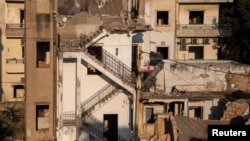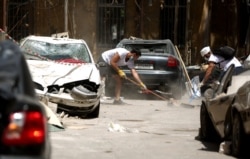U.N. agencies are revising their emergency appeals to keep pace with the growing needs of hundreds of thousands of survivors of last week’s devastating explosions in Lebanon’s capital, Beirut. The United Nations is expected to issue a comprehensive multimillion-dollar flash appeal for humanitarian aid Friday.
Aid workers only now are coming to grips with the magnitude of the disaster. More than 150 people reportedly have been killed, with around 600,000 injured, including 100,000 children. Homes, buildings and infrastructure have been damaged and destroyed, rendering an estimated 300,000 homeless.
U.N. Development Program crisis adviser Rekha Das, on a video link from Beirut, said the blast that hit the capital has impacted all of Lebanon.
“The coping capacities of the people in Lebanon have been tried beyond anybody’s imagination — through a crippling economic crisis, the COVID-19 pandemic that we are all so familiar with and aware of, and now the blast. … Within seconds, Beirut was covered in layers and layers of debris,” Das said.
She said the UNDP, which was in Lebanon before the blast, will remain in the country cleaning, repairing and doing whatever it takes, for however long it takes, to help the Lebanese people recover.
Migrants, refugees
The International Organization for Migration is appealing for $10.3 million to help more than 43,000 migrants and refugees affected by the explosions.
The U.N. migration agency estimates 8 percent of the 300,000 people affected in Beirut are migrant workers from Ethiopia, Bangladesh and the Philippines. IOM spokeswoman Angela Wells told VOA her agency hopes to use some of the appeal money to start returning migrants to their home countries through its voluntary return program.
She said the IOM, in coordination with the U.N. refugee agency, also will continue to resettle refugees from Lebanon.
“Many of them are Syrian, but they come from other places as well,” Wells said. “And we are resettling them to third countries. So, we will not be returning any Syrians to Syria. We will be resettling them to places like Canada, Australia, Europe. These are operations that have been happening from Lebanon for years now. More than 100,000 people have been resettled from Lebanon as of last year. And, of course, that number has now risen.”
The IOM said its humanitarian operation also will provide health care, food, shelter and short-term employment opportunities. In addition, it said it will assist migrants and refugees who need mental health and psychosocial support, and protect those at risk of exploitation.





